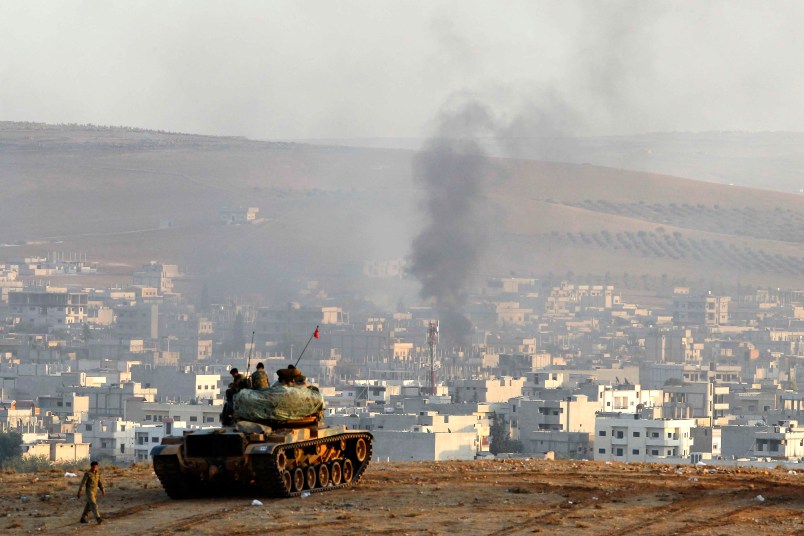BEIRUT (AP) — Syrian government-run media said the country’s air defenses confronted a new “aggression,” shooting down missiles over the central region of Homs and a suburb of Damascus early on Tuesday.
The reports did not say who carried out the pre-dawn strikes, which were reported by Syrian state TV and the government-run Syrian Central Media. The reports, however, were not carried by the official news agency SANA on its website.
The reports came just a few days after the United States, Britain and France conducted airstrikes targeting alleged chemical weapons facilities in Syria, in retaliation for a suspected chemical weapons attack that they blamed on the Syrian government.
The Pentagon denied any American military activity in the area Tuesday. There was no comment from Israel, which frequently carries out airstrikes in Syria but rarely acknowledges them.
The Syrian Central Media said six missiles targeted the Shayrat air base in Homs, adding that Syrian air defenses shot down most of them. Previously, the same air base was hit by U.S. Tomahawk missiles in April last year, in retaliation for a suspected chemical weapons attack in the country’s north that killed around 90 people.
The Syrian outlet also reported another, separate airstrike on the Dumayr air base, in a suburb of the capital, Damascus.
Earlier this month, four Iranian military personnel were killed in an airstrike on Syria’s T4 air base, also in Homs. Syria and its main allies Iran and Russia blamed Israel for that attack. Israel did not confirmed or deny mounting the raid.
Experts from the international chemical weapons watchdog are now in Damascus and have been waiting to visit the site of the suspected chemical attack in the town of Douma, just east of Damascus.
On Monday, Syrian and Russian authorities prevented investigators from the Organization for the Prohibition of Chemical Weapons from going to the scene, the head of the OPCW said, blocking international efforts to establish what happened and who was to blame.
The U.S. and France say they have evidence that poison gas was used in the April 7 attack in Douma, killing at least 40 people, and that Syrian President Bashar Assad’s military was behind it.
But they have made none of that evidence public, even after they, along with Britain, carried out airstrikes on Saturday, bombing sites they said were linked to Syria’s chemical weapons program.
Syria and its ally Russia deny any chemical attack took place, and Russian officials went even further, accusing Britain of staging a “fake” chemical attack. British Prime Minister Theresa May accused the two countries — whose forces now control the town east of Damascus — of trying to cover up evidence.
The lack of access to Douma has left unanswered questions about the attack. OPCW Director-General Ahmet Uzumcu said Syrian and Russian officials cited “pending security issues” in keeping its inspectors from reaching Douma.
“The team has not yet deployed to Douma,” Uzumcu told an executive council meeting of the OPCW in The Hague on Monday.
Instead, Syrian authorities offered them 22 people to interview as witnesses, he said, adding that he hoped “all necessary arrangements will be made … to allow the team to deploy to Douma as soon as possible.”
Russian military police were ready to help protect the OPCW experts on their visit to Douma, said Maj. Gen. Yuri Yevtushenko of the Russian military’s Reconciliation Center in Syria. Igor Kirillov, a Russian chemical weapons protection expert in The Hague, said the team is set to visit the site Wednesday.
Earlier Monday, Russian Deputy Foreign Minister Sergei Ryabkov said the inspectors could not go to the site because they needed approval from the U.N. Department for Safety and Security. He denied that Russia was hampering the mission and suggested the approval was held up because of the Western airstrikes.
However, U.N. spokesman Stephane Dujarric said the United Nations has “provided the necessary clearances for the OPCW team to go about its work in Douma. We have not denied the team any request for it to go to Douma.”
Until Saturday, Douma was the last rebel-held town near Damascus, and the target of a government offensive in February and March that killed hundreds and displaced tens of thousands.
Hours after the alleged chemical attack, the rebel faction that controlled the town, the Army of Islam, relented and was evacuated along with thousands of residents.
The Associated Press, during a government-organized visit Monday to Douma, spoke to survivors and witnesses who described being hit by gas. Several said a strange smell started spreading and people screamed, “It’s chlorine! It’s chlorine!”
The AP visited a two-room underground shelter where Khaled Mahmoud Nuseir said 47 people were killed, including his pregnant wife and two daughters, 18-month-old Qamar and 2 1/2-year-old Nour. A strange smell lingered, nine days after the attack.
Nuseir, 25, said he ran from the shelter to a nearby clinic and fainted. After he was revived, he returned to the shelter and found his wife and daughters dead, with foam coming from their mouths.
He and two other residents accused the rebel Army of Islam of carrying out the attack. As they spoke, government troops were not far away but out of earshot. Nuseir said a gas cylinder was found leaking the poison gas, adding that he didn’t think it was dropped from the air because it still looked intact.
Separately, the AP spoke to a medic who was among those who later were evacuated to northern Syria. Ahmed Abed al-Nafaa said helicopters were flying before the attack and when he reached the site, people were screaming “chlorine.” He said he tried to enter the shelter but was overcome by a strong smell of chlorine and his comrades pulled him out.
The accounts contradict what the Syrian government and Russia have reported: that there was no gas attack in Douma.
___
Associated Press Writer Bassem Mroue in Douma, Syria, contributed to this report.






